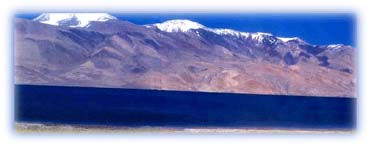Ladakh himalayas
General Info
· Villages
· Valleys and plateaus
· Lakes
· Passes
· Glaciers
· Rivers
· People
· Ladakhis
· Livelihood
· Shia Muslims of Kargil
· Occupations
· Gujjars
· Brokpas
· Tradition and Culture
· Livelihood
· Baltis
· Livelihood
· Religion, tradition, culture
· Changpas
· Livelihood
· Religion
· Fairs and festivals
· Other places of interest

![]()
| Tradition and culture The members of this community lead a purely nomadic existence, although many relatively rich families also maintain a permanent home in Rupshu, the largest settlement of this region. |
 |
| Tsomo Riri lake Credit: Discover India magazine |
The Changpas live in tents made from the hair of the yaks and goats all the year round -- even during the peak winters. Hutments made of stones are also being used nowadays. These have been constructed in the main settlements at Rupshu, Puga and Karzok. There are good alpine pastures in this area to which these communities move during various parts of the year with their cattle.
They camp there for a specific period of time after which the whole family moves to another place. The use of pastures is usually hereditary and the right is passed on from one generation to the other.
Members of this community are god-fearing and believe in local gods or deities. Many of them are Buddhists.
All rights reserved